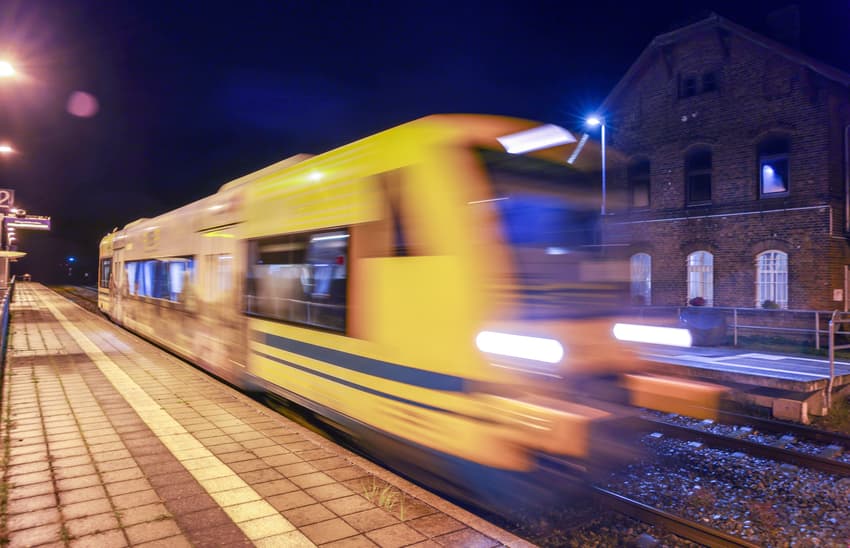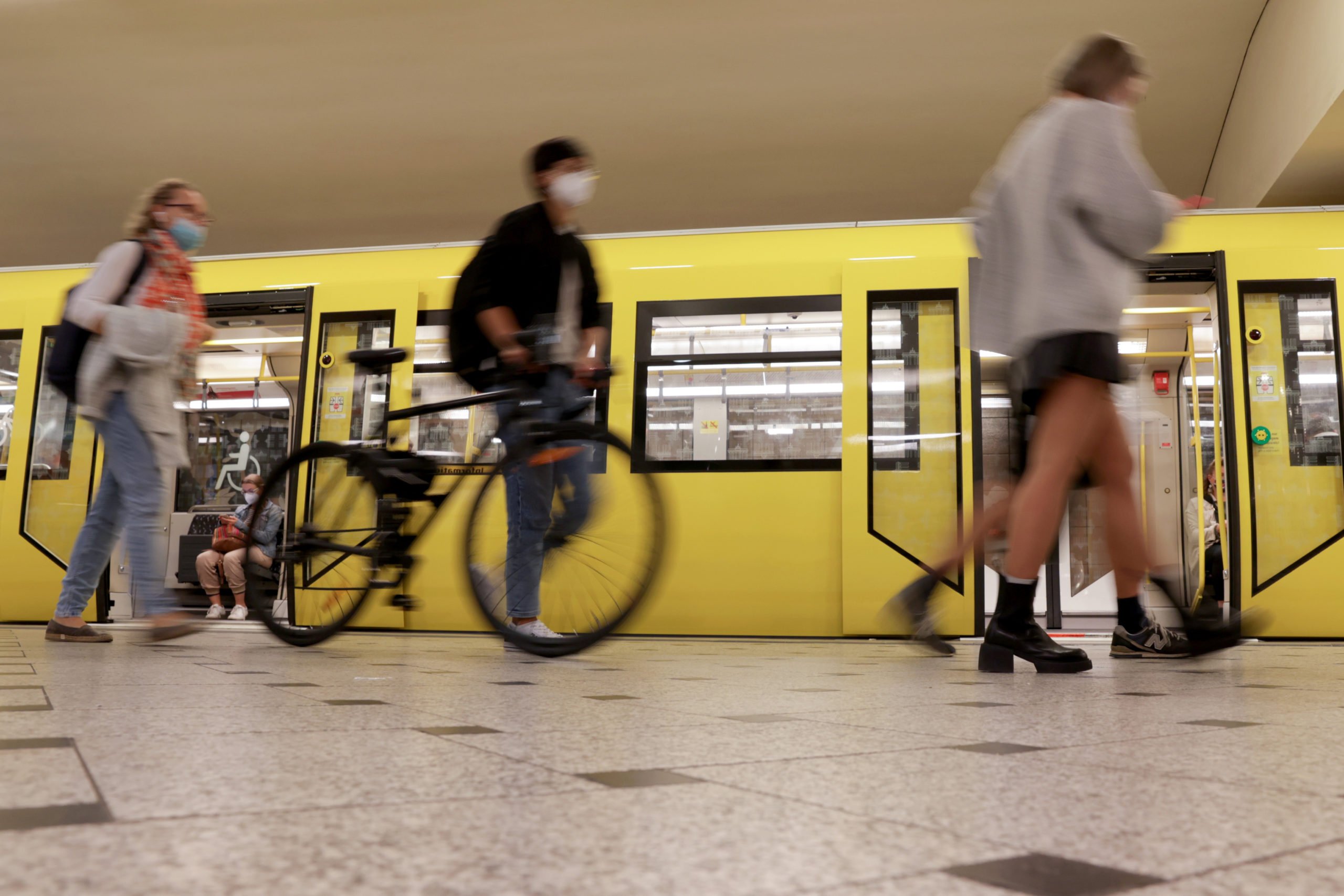'Deutschlandticket': What you need to know about Germany's new €49 travel ticket

Germany has officially welcomed the follow-up to this summer’s €9 travel ticket: a nationwide €49 monthly ticket set to come into effect early next year. Here's what you need to know.
The new ticket was agreed upon Wednesday between Germany’s federal and state governments.
The newly dubbed "Deutschlandticket" is slated to come into circulation at the beginning of January, said Federal Transport Minister Volker Wissing (FDP) at the discussion round.
"Now the way is clear for the biggest public transport fare reform in Germany,” he said.
However, some of the ministers, such as Baden-Württemberg state premier Winfried Kretschmann of the Greens, remained sceptical that the ticket would really be issued by the slated date, stating that the spring of 2023 was more likely for a roll-out.
READ ALSO: Germany to set out plans for 49 travel ticket in October
How does it work?
The digital Deutschlandticket, which is to be valid all throughout Germany, will be available for an introductory price of €49 per month through a subscription that can be cancelled monthly, as opposed to yearly like other existing transport subscriptions.
While it’s not yet possible to purchase the ticket, sales will likely begin two weeks before the ticket is introduced.
As with its €9 predecessor, it can be used for all local transport (U-Bahn, S-Bahn, and trams) as well as Deutsche Bahn regional trains.
The aim of the ticket, according to the state and federal ministers, is to boost the attractiveness of public transport while also massively cutting down on carbon emissions.
But for people in Germany, its biggest goal is to relieve the financial burden of public transport, with many local tickets alone costing between €80 and €100 per month.
The Deutschlandticket itself is expected to cost the government a total of €3 million, with half to be taken up at the federal level and half at the state level.
The new ticket ties in with a larger plan to bolster public transport. The government has also vowed to set aside a further billion per year for the regional expansion of local transport. From 2023 onward, this is to be increased by three percent a year.

Passengers exit an U-Bahn train at Zoologischer Garten. Photo: picture alliance/dpa | Jörg Carstensen
Could the ticket become more expensive (or cheaper)?
Germany’s transport ministers are planning a two-year introductory phase for the Deutschlandticket. Starting the second year, however, the ticket could become more expensive in order to compensate for inflation.
The ministers also said they hoped the ticket itself would help keep inflation in check - but economists were more sceptical.
Holger Schmieding, chief economist at Berenberg Bank, said that the inflation rate - currently a staggering 10 percent -- will be depressed "only to a small extent," "perhaps by 0.1 percentage points."
Some were also critical that the new ticket was too expensive, pointing out that not all people in Germany could afford to fork out over €49 a month.
"That's why we continue to call for a €365 ticket. One euro per day for mobility, that would really be socially acceptable," said Germany's Sozialverband after the meeting.
Picking up speed
The managing director of the Pro-Rail Alliance, Dirk Flege, said the new ticket showed that the €9 ticket in the summer was not a one-time phenomenon.
"Rather, the federal and state governments are now jointly taking into account the will of the people, who have impressively demonstrated that they want to take more buses and trains if the framework conditions are right," he said.
In June, July and August, the €9 ticket allowed passengers to travel on buses and trains for one month each. A full 50 million were sold, covering one billion trips per month.
A total of 1.8 million tonnes of CO2 were also saved during the three month period, according to German transport companies association (VDV).
As a successor, the state of Berlin has already introduced a €29 ticket, as well as a €9 ‘social ticket’, which is also set to go into effect next year.
READ ALSO: How will Berlin's new 29 travel ticket work?
Jens Hilgenberg, head of transport policy at BUND, said that public transport is the backbone of the ‘mobility turnaround’ and therefore needs further, additional sources of funding. Among other things, revenue from a toll for trucks would have to be used to support its expansion.
According to a survey conducted by the opinion research institute Civey for Spiegel, most Germans are looking forward to the ticket: 55 percent of people rated the new ticket ‘very or somewhat’ positive, with only 23 percent giving it a negative assessment. Only 23 percent view the ticket negatively.
Comments
See Also
The new ticket was agreed upon Wednesday between Germany’s federal and state governments.
The newly dubbed "Deutschlandticket" is slated to come into circulation at the beginning of January, said Federal Transport Minister Volker Wissing (FDP) at the discussion round.
"Now the way is clear for the biggest public transport fare reform in Germany,” he said.
However, some of the ministers, such as Baden-Württemberg state premier Winfried Kretschmann of the Greens, remained sceptical that the ticket would really be issued by the slated date, stating that the spring of 2023 was more likely for a roll-out.
READ ALSO: Germany to set out plans for 49 travel ticket in October
How does it work?
The digital Deutschlandticket, which is to be valid all throughout Germany, will be available for an introductory price of €49 per month through a subscription that can be cancelled monthly, as opposed to yearly like other existing transport subscriptions.
While it’s not yet possible to purchase the ticket, sales will likely begin two weeks before the ticket is introduced.
As with its €9 predecessor, it can be used for all local transport (U-Bahn, S-Bahn, and trams) as well as Deutsche Bahn regional trains.
The aim of the ticket, according to the state and federal ministers, is to boost the attractiveness of public transport while also massively cutting down on carbon emissions.
But for people in Germany, its biggest goal is to relieve the financial burden of public transport, with many local tickets alone costing between €80 and €100 per month.
The Deutschlandticket itself is expected to cost the government a total of €3 million, with half to be taken up at the federal level and half at the state level.
The new ticket ties in with a larger plan to bolster public transport. The government has also vowed to set aside a further billion per year for the regional expansion of local transport. From 2023 onward, this is to be increased by three percent a year.

Could the ticket become more expensive (or cheaper)?
Germany’s transport ministers are planning a two-year introductory phase for the Deutschlandticket. Starting the second year, however, the ticket could become more expensive in order to compensate for inflation.
The ministers also said they hoped the ticket itself would help keep inflation in check - but economists were more sceptical.
Holger Schmieding, chief economist at Berenberg Bank, said that the inflation rate - currently a staggering 10 percent -- will be depressed "only to a small extent," "perhaps by 0.1 percentage points."
Some were also critical that the new ticket was too expensive, pointing out that not all people in Germany could afford to fork out over €49 a month.
"That's why we continue to call for a €365 ticket. One euro per day for mobility, that would really be socially acceptable," said Germany's Sozialverband after the meeting.
Picking up speed
The managing director of the Pro-Rail Alliance, Dirk Flege, said the new ticket showed that the €9 ticket in the summer was not a one-time phenomenon.
"Rather, the federal and state governments are now jointly taking into account the will of the people, who have impressively demonstrated that they want to take more buses and trains if the framework conditions are right," he said.
In June, July and August, the €9 ticket allowed passengers to travel on buses and trains for one month each. A full 50 million were sold, covering one billion trips per month.
A total of 1.8 million tonnes of CO2 were also saved during the three month period, according to German transport companies association (VDV).
As a successor, the state of Berlin has already introduced a €29 ticket, as well as a €9 ‘social ticket’, which is also set to go into effect next year.
READ ALSO: How will Berlin's new 29 travel ticket work?
Jens Hilgenberg, head of transport policy at BUND, said that public transport is the backbone of the ‘mobility turnaround’ and therefore needs further, additional sources of funding. Among other things, revenue from a toll for trucks would have to be used to support its expansion.
According to a survey conducted by the opinion research institute Civey for Spiegel, most Germans are looking forward to the ticket: 55 percent of people rated the new ticket ‘very or somewhat’ positive, with only 23 percent giving it a negative assessment. Only 23 percent view the ticket negatively.
Join the conversation in our comments section below. Share your own views and experience and if you have a question or suggestion for our journalists then email us at [email protected].
Please keep comments civil, constructive and on topic – and make sure to read our terms of use before getting involved.
Please log in here to leave a comment.